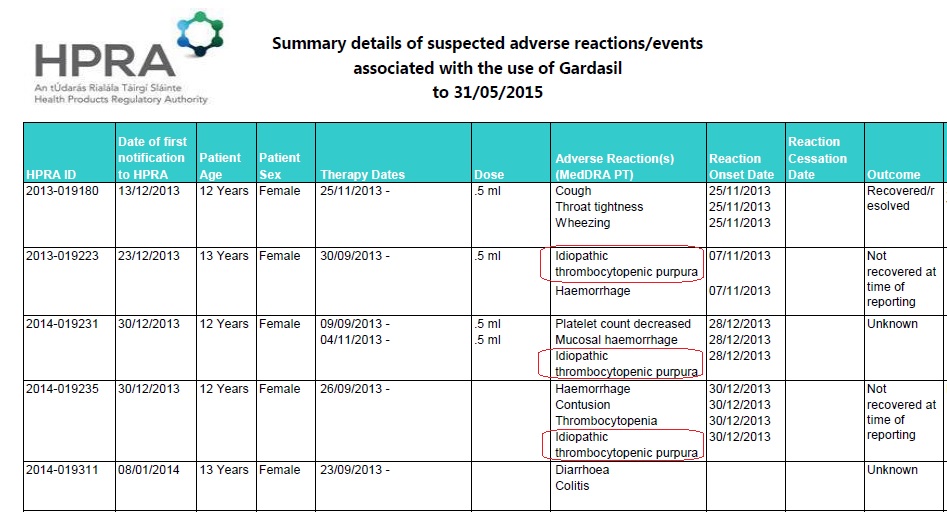






Ireland: Very Rare and Debilitating Blood Disorder Reported after Gardasil Vaccination (Three Cases in One Week!)
By Martin Healy,
TweetRegret.ie, 14 Jun 2015.
The REGRET Group recently received a list of all the adverse reactions reported to the Irish Health Regulatory Authority (HPRA) following vaccination with the HPV vaccine Gardasil. Analysis is ongoing, but one week in particular stood out (the last week of 2013) because three cases of a very rare immune system related blood disorder were reported in that week. Normal incidence of Idiopathic Thrombocytopenic Purpura (ITP) in childhood is approximately 1-4 cases per 100,000 per year in western europe. Gardasil was injected into approximately 45,000 Irish school girls that year. If, for example, we were to see 3 new ITP cases every 2 months for that group of schoolgirls, that would represent at least a 9-fold increase in the expected incidence.
In this article we will try to answer the following questions:
- Can we show a causal link with Gardasil, even though the condition only developed 5 to 8 weeks after the victim was injected?
- Why have no such cases been reported before or since?
- Is the HPRA actively monitoring and investigating serious adverse reactions such as these?
What is IPT?
Idiopathic Thrombocytopenic Purpura (ITP) is an autoimmune disease characterised by a low blood platelet count, which occurs when your body’s immune system destroys its own platelets in the same way as it would destroy harmful invaders such as bacteria. Baxter Ireland website describes the mechanism as follows:
"Usually when foreign invaders (pathogens) are detected by the immune system, the body makes antibodies which then coat the bacteria, marking them for destruction. In ITP, the body mistakenly produces antibodies against its own platelets. The immune system has lost some of its ability to distinguish between foreign substances and the body’s own cells. The antibody-coated platelets are destroyed by specialised cells called macrophages, which exist in large numbers in the spleen".
Platelets are important for helping the blood to clot and stop bleeding. IPT can be a debilitating lifelong condition which in some cases may require extreme interventions such as spleen removal. A mother of one of the three victims reported above has written an account for Regret.ie about how life has changed for her daughter since receiving the Gardasil vaccination:
"She has had to endure surgery, bone marrow biopsy and aspiration, countless rounds of steroids and their horrible side effects, transfusions of IVIG (intravenous immune globulin) and lastly, weekly treatment for 4 weeks with a drug used normally for cancer patients".
Can Gardasil trigger IPT?
In order to produce high antibody levels, a vaccine must hyper-activate the immune system. However chronic stimulation also induces different autoantibodies which may then develop into a specific autoimmune disease. There is no question that vaccine induced ITP is real. A report authored by a researcher from the Immunisation Division, Public Health Laboratory Service Communicable Disease Surveillance Centre, London and published in the Archives of Disease in Childhood journal in 2001, confirmed that two of every three cases of ITP occurring in the six week post-immunisation period was caused by the MMR vaccine.
On further investigation, a search of the peer-reviewed literature on PubMed for just one phrase "vaccine induced ITP" returned 18 results:
"Immune thrombocytopenic purpura (ITP) is an adverse event that can really follow vaccine administration, and may limit vaccine use because little is known about which vaccines it may follow, its real incidence and severity, the risk of chronic disease, or the possibility of recurrences after new doses of the same vaccine".
From "Vaccine administration and the development of immune thrombocytopenic purpura in children" (Cecinati, 2013)
"..infectious or environmental agents may trigger the immune response to produce platelet-reactive autoantibodies 4 to 8 weeks following an infection".
From Childhood immune thrombocytopenic purpura (Nugent, 2002)
With respect to the three cases identified above, the 4-8 weeks window corresponds to the time period from when the victim was exposed to the 'environment agent' (i.e Gardasil) until the disorder first manifested. Not surprisingly, ITP is listed in the "Adverse Reactiions" section of the Gardasil Patient Information Leaflet supplied by the vaccine maker. In the US, the non-profit group Sanevax have highlighted many suspected gardasil-induced-ITP cases reported through the official government reporting system VAERS.
Why no other cases before or since?
Although the three cases were reported to HPRA in one week, the conditions first presented over a seven week period (two in 3 days and the other 7 weeks earlier). It is logical to assume there are other unreported cases from the remaining four and a half years - indeed REGRET has been contacted by the family of a girl suffering post-Gardasil ITP not yet reported to HPRA. A question that could be asked is why these 3 cases got reported and not the others?
Reporting of suspected vaccine reactions in Ireland depends on the voluntary submission of a report from a doctor, consultant or medical professional. However, most doctors will not acknowledge any connection between a vaccine and a subsequent serious medical condition that manifests in the weeks or months afterwards. At least that has been the experience of most of the families who have shared their stories with the REGRET* Support group. This is also the experience in the US according to Norma Erikson, president of Sanevax. When asked on the James Tracy radio show (April 2015) if doctors are trained to be able to detect likely adverse reactions, her response was:
"In fact ,quite the opposite, they are trained to "know" that adverse reactions to vaccinations are so rare that they will probably never see one in their entire career".
The then chairman of the Irish National Immunisation Advisory Committee (NIAC), Professor Denis Gill was asked about vaccine safety in 2013. His response was:
"Serious reactions to vaccination are extremely rare. I used to run in Temple Streent (Hospital) what we call a 'high risk vaccination clinic', where children who were deemed to be high risk would come to us and I can tell you over 5 years we had nothing. No admissions, no reactions..Most doctors in their entire practicing life will never see a serious reaction to a vaccination. They will see minor reactions all the time. They are expected".
But there may be other reasons why doctors and consultants fail to report suspicions of side effects. According to Kari Lankinen, head physician of the Finnish Medicines Agency, doctors were complicit in hiding the link between the swine flu shot and narcolepsy and did so to advance their careers. Finland was the first country to suspend the H1N1 Pandemrix swine flu vaccine after 15 new cases in a 6 month period (normally 3 cases would be expected for that same period). Ireland continued to use this vaccine for four months after the scandinavian countries had suspended it, in part because no Irish doctors had reported any narcolepsy cases.
Is the HPRA actively monitoring or investigating serious adverse reactions?
As shown in this article, there is a clear time correlation between these ITP cases and the Gardasil vaccination. If HPRA were monitoring the adverse events reports (846 cases reported so far), it is logical to assume that the vaccine program would have been suspended and further investigation done to establish the incidence of ITP and other autoimmune diseases in teenage girls. This has happened already in Japan, and as a result of the subsequent investigation, Japan no longer recommends the HPV vaccine. With the Irish reporting system, information on whether the victim has recovered or not at the time of reporting is captured, but there is no evidence of any follow-up monitoring or investigation. For example, if the status of the case report happens to be "Not recovered at time of reporting", then that status will remain unchanged for all future reporting purposes.
The recent "copy/paste" answers provided by the Minister for Health when questioned recently in parliament confirms the lack of interest at government level in the needless destruction of healthy teenage lives which the REGRET Group is trying to highlight. The Minister's response indicated that there are no plans to introduce a vaccine compensation fund in Ireland and he had nothing to say about who is responsible financially for the medical costs of those who, as a result of receiving the HPV vaccine, now have severe health issues. Apparently, in Ireland, vaccine makers have immunity from being sued for compensation for vaccine injury.
Although its cancer-preventing properties have never been proven, the National Immunisation Office insists that the benefits of Gardasil outweigh the risks, and even claim that it has been 'fully tested', This is despite the limited safety testing that took place as a result of this "life-saving vaccine" being fast-tracked through the regulatory approval process. HSE did not inform parents that Gardasil contains genetically engineered non-human recombinant DNA, the effects of which are unknown and unpredictable when injected into a human host.
Current status of adverse reactions to Gardasil in Ireland
The HPRA report (May 31, 2015) shows 846 reports of suspected HPV vaccine adverse reactions since schools program launched in Ireland in Sep 2010 . Of which
- 11 Still "Recovering"
- 89 "Not recovered at time of reporting"
- 83 "Outcome" is "Unknown"
The most recent HPRA report up to 31 Dec 2015 reveal a further 94 reports of suspected HPV vaccine adverse reactions for last 6 months of 2015. Of which, 21 reported having 'seizure'. The HPRA no longer provide 'Outcome' info to the public, so it is no longer possible to identify figures for category "Not recovered at time of reporting" for example.
*R.E.G.R.E.T. is an acronym for "Reactions and Effects of Gardasil Resulting in Extreme Trauma".

 If your child has suffered health issues that you think may have been triggered by Gardasil, and you wish to get in contact with other parents who have had a similar experience, please contact us at:
If your child has suffered health issues that you think may have been triggered by Gardasil, and you wish to get in contact with other parents who have had a similar experience, please contact us at: 
